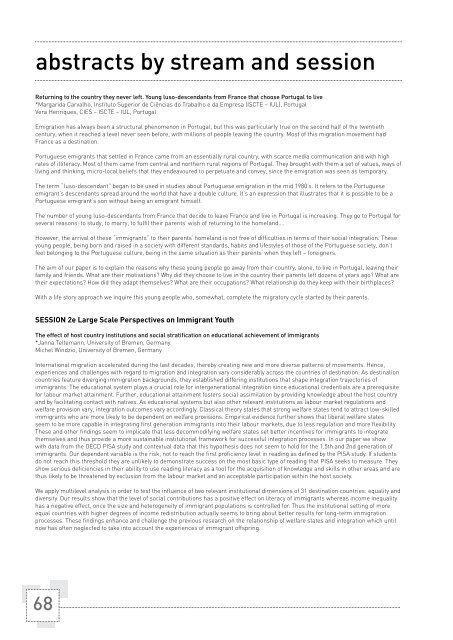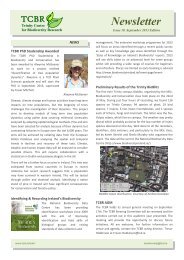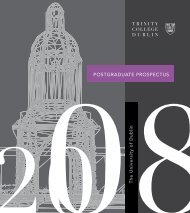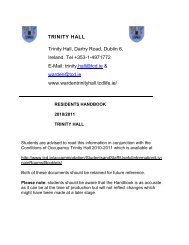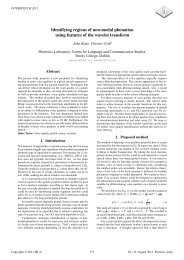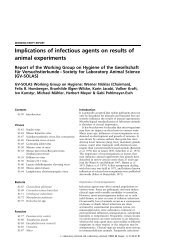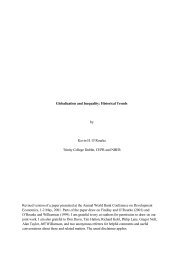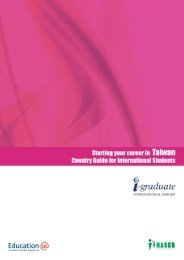Conference Programme (PDF, 1019KB) - Trinity College Dublin
Conference Programme (PDF, 1019KB) - Trinity College Dublin
Conference Programme (PDF, 1019KB) - Trinity College Dublin
You also want an ePaper? Increase the reach of your titles
YUMPU automatically turns print PDFs into web optimized ePapers that Google loves.
abstracts by stream and session<br />
Returning to the country they never left. Young luso-descendants from France that choose Portugal to live<br />
*Margarida Carvalho, Instituto Superior de Ciências do Trabalho e da Empresa (ISCTE – IUL), Portugal<br />
Vera Henriques, CIES – ISCTE – IUL, Portugal<br />
Emigration has always been a structural phenomenon in Portugal, but this was particularly true on the second half of the twentieth<br />
century, when it reached a level never seen before, with millions of people leaving the country. Most of this migration movement had<br />
France as a destination.<br />
Portuguese emigrants that settled in France came from an essentially rural country, with scarce media communication and with high<br />
rates of illiteracy. Most of them came from central and northern rural regions of Portugal. They brought with them a set of values, ways of<br />
living and thinking, micro-local beliefs that they endeavoured to perpetuate and convey, since the emigration was seen as temporary.<br />
The term “luso-descendant” began to be used in studies about Portuguese emigration in the mid 1980’s. It refers to the Portuguese<br />
emigrant’s descendants spread around the world that have a double culture. It’s an expression that illustrates that it is possible to be a<br />
Portuguese emigrant’s son without being an emigrant himself.<br />
The number of young luso-descendants from France that decide to leave France and live in Portugal is increasing. They go to Portugal for<br />
several reasons: to study, to marry, to fulfil their parents’ wish of returning to the homeland….<br />
However, the arrival of these “immigrants” to their parents’ homeland is not free of difficulties in terms of their social integration. These<br />
young people, being born and raised in a society with different standards, habits and lifestyles of those of the Portuguese society, don’t<br />
feel belonging to the Portuguese culture, being in the same situation as their parents’ when they left – foreigners.<br />
The aim of our paper is to explain the reasons why these young people go away from their country, alone, to live in Portugal, leaving their<br />
family and friends. What are their motivations? Why did they choose to live in the country their parents left dozens of years ago? What are<br />
their expectations? How did they adapt themselves? What are their occupations? What relationship do they keep with their birthplaces?<br />
With a life story approach we inquire this young people who, somewhat, complete the migratory cycle started by their parents.<br />
SESSION 2e Large Scale Perspectives on Immigrant Youth<br />
The effect of host country institutions and social stratification on educational achievement of immigrants<br />
*Janna Teltemann, University of Bremen, Germany<br />
Michel Windzio, University of Bremen, Germany<br />
International migration accelerated during the last decades, thereby creating new and more diverse patterns of movements. Hence,<br />
experiences and challenges with regard to migration and integration vary considerably across the countries of destination. As destination<br />
countries feature diverging immigration backgrounds, they established differing institutions that shape integration trajectories of<br />
immigrants. The educational system plays a crucial role for intergenerational integration since educational credentials are a prerequisite<br />
for labour market attainment. Further, educational attainment fosters social assimilation by providing knowledge about the host country<br />
and by facilitating contact with natives. As educational systems but also other relevant institutions as labour market regulations and<br />
welfare provision vary, integration outcomes vary accordingly. Classical theory states that strong welfare states tend to attract low-skilled<br />
immigrants who are more likely to be dependent on welfare provisions. Empirical evidence further shows that liberal welfare states<br />
seem to be more capable in integrating first generation immigrants into their labour markets, due to less regulation and more flexibility.<br />
These and other findings seem to implicate that less decommodifying welfare states set better incentives for immigrants to integrate<br />
themselves and thus provide a more sustainable institutional framework for successful integration processes. In our paper we show<br />
with data from the OECD PISA study and contextual data that this hypothesis does not seem to hold for the 1.5th and 2nd generation of<br />
immigrants. Our dependent variable is the risk, not to reach the first proficiency level in reading as defined by the PISA study. If students<br />
do not reach this threshold they are unlikely to demonstrate success on the most basic type of reading that PISA seeks to measure. They<br />
show serious deficiencies in their ability to use reading literacy as a tool for the acquisition of knowledge and skills in other areas and are<br />
thus likely to be threatened by exclusion from the labour market and an acceptable participation within the host society.<br />
We apply multilevel analysis in order to test the influence of two relevant institutional dimensions of 31 destination countries: equality and<br />
diversity. Our results show that the level of social contributions has a positive effect on literacy of immigrants whereas income inequality<br />
has a negative effect, once the size and heterogeneity of immigrant populations is controlled for. Thus the institutional setting of more<br />
equal countries with higher degrees of income redistribution actually seems to bring about better results for long-term immigration<br />
processes. These findings enhance and challenge the previous research on the relationship of welfare states and integration which until<br />
now has often neglected to take into account the experiences of immigrant offspring.<br />
68


